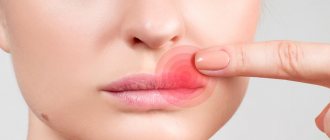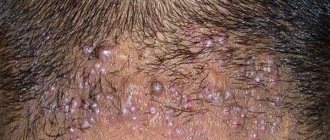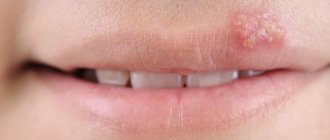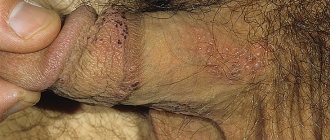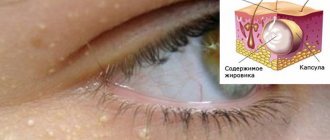Why did herpes appear on the gums?
For the virus to make itself felt, two things are enough: its presence in the blood and a weakened immune system.
Infection occurs by airborne droplets and can be transmitted from mother to child. Unfortunately, once you become infected with herpes, you can no longer get rid of it. But you can prevent its activation.
So, after infection, virus particles settle in the body forever. Most of the time the virus does not manifest itself in any way. What factors provoke the manifestation of the virus on the gums? Stress, including sudden nervous shock, chronic depression and fatigue, colds, bacterial and viral diseases, hypothermia, autumn or spring hypovitaminosis. A common cause of the appearance of “bubbles” characteristic of this disease is acclimatization. Are you familiar with the situation when the disease manifests itself on vacation, when changing time zones? Therefore, when planning trips, it is better to immediately stock up on antiviral drugs and ointments.
How to distinguish herpes sore throat from stomatitis?
Despite the fact that these medical terms have the same grammatical root, herpetic sore throat and herpetic stomatitis are two different diseases. Unlike stomatitis, herpes sore throat occurs not due to the penetration of the herpes virus, but as a result of an adenovirus infection (in particular, the Coxsackie A virus). Children are more likely to suffer from this disease than adults. The rashes are localized, for the most part, on the soft palate and tonsils. Typical symptoms of stomatitis include pain in the abdomen and abnormal bowel movements.
Attention!
The disease begins acutely, with a jump in temperature to 40 degrees, and is severe, so differential diagnosis should only be carried out by a doctor.
How to recognize herpes
The difficulty is that the symptoms of herpes in the mouth are easily confused with the manifestation of stomatitis and other diseases of the oral mucosa.
Differences:
- as a rule, stomatitis affects a larger area of the oral mucosa compared to herpes;
- swelling with herpes is less: with stomatitis, there may even be traces of teeth on the mucous membrane of the cheeks;
- ulcers that form during stomatitis have more defined boundaries;
- stomatitis often contributes to the appearance of a very dense coating on the tongue; with herpes, such a symptom does not appear;
- very often with stomatitis (especially purulent, with ulcers), the pain is more intense, it intensifies when the disease spreads over a large area of the mucous membrane. The pain is aching, especially in ulcers, and it becomes difficult to eat food, especially hard and hot food.
Photo of herpes on the gum:
If measures are not taken in time, a viral infection can become complicated and take the form of herpetic stomatitis:
How to understand that the virus has been activated? The first symptoms are tingling on the gums, itching and burning sensation. Then the color of the oral mucosa may change, unpleasant swelling appears locally, then a bright red rash appears, and the last stage is the formation of characteristic “bubbles” with liquid. As the disease progresses, the pain intensifies. When bubbles appear (they are called vesicles), the pain becomes cutting, its intensity increases when eating food or hot drinks.
Vesicles are dropsy filled with fluid with a high concentration of virus. Their sizes increase over time and can reach from 1 mm to 1 cm in diameter. At some point they burst, leaving a painful wound. If an infectious infection occurs, the wound becomes covered with a yellow crust, the mucous membrane of the oral cavity is increasingly affected, flowing into diffuse stomatitis.
External symptoms may include:
- increase in body temperature up to 38 degrees;
- chills;
- increase in size of lymph nodes;
- weakness, loss of strength;
- headache.
Such symptoms more often appear in children, with severe disease and the presence of an inflammatory process. In this case, you cannot do without consulting a doctor.
As a rule, the clinical picture of the disease is obvious. If a relapse does not occur for the first time, often the blisters are localized in the same areas: on the inner surface of the cheeks, tongue, gums. Your doctor may prescribe an oral swab to rule out a fungal or bacterial infection.
There are several types of herpes. As a rule, virus strains 1 and 2 appear on the gums. The consequences can be serious, especially if action is not taken promptly. If it was possible to extinguish the external manifestations of the infection, this is not a reason to refuse further treatment. First of all, you need to determine what type of herpes the patient is dealing with: PCR diagnostics will help with this. If you have a herpes infection, you can contact specialists such as an ENT specialist, an infectious disease specialist, or an immunologist. They will help you choose a treatment regimen that will minimize relapses of the disease in the future.
Forms of the disease
Lightweight
It is considered the most beneficial for the body. In this form, people with high immunity suffer from herpes stomatitis. It flows without temperature. It is distinguished by single rashes that do not cause discomfort and disappear on their own without consequences.
Average
General disorders are added: weakness, drowsiness, fatigue, loss of appetite. Rashes appear in several places at the same time. The temperature rises to 37-37.6°C.
Heavy
This form of stomatitis indicates extremely low immunity. The rashes are multiple and painful. Severe headache, chills, and vomiting appear. The temperature exceeds 38oC.
If the disease is mild, the patient may not notice any external signs!
Antiviral drugs
Their goal is to suppress the pathogen, shorten the duration of the exacerbation, and reduce the intensity of symptoms. The most popular products are Acyclovir and Zovirax in the form of tablets and creams. Using cream in the mouth is difficult, so tablets are optimal. They drink them in a course.
It is better to start treatment at the first signs of the disease. In some cases it can be stopped. Interferon nasal drops have also shown their effectiveness in the initial stages of herpes. At the very least, they prevent the spread of infection into the respiratory tract.
We have already found out that the main reason for the manifestation of herpes is weakened immunity. Conclusion: to avoid relapses, it is necessary to increase the body's defenses. To do this, you should contact an immunologist, who will refer you for diagnostics and prescribe individual treatment. Sometimes it includes immunomodulators - drugs that can increase immunity (Immunal, Imudon and others), folk remedies (for example, echinacea tincture), vitamin and mineral complexes. You can also take specialized complexes of vitamins and minerals, for example, ASEPTA® Parodontal to strengthen teeth and gums: its active components help not only reduce bleeding and inflammation in the oral cavity, but also maintain general immunity.
General recommendations on how to strengthen the body and increase its protection:
- avoid stress, improve sleep;
- include as many fresh vegetables, fruits, and herbs in your diet as possible;
- to drink a lot of water;
- exercise or swimming.
In case of exacerbation of herpes on the gums, it is recommended to adhere to a diet: remove spicy, fatty, too hot foods from the diet, exclude hot and alcoholic drinks. To avoid irritating the mucous membranes, avoid smoking.
The difficulty of using creams and ointments is not a reason to refuse local treatment for herpes. Rinsing and irrigating the oral mucosa will help relieve symptoms and prevent the spread of infection. Good products: Hexoral, chlorhexidine, hydrogen peroxide solution, furatsilin, as well as anesthetic sprays, rinsing solutions, gels with anesthetics (for example, Lidoxor gel, which relieves burning and irritation). Adhesive gum balm ASEPTA® is an effective combined antimicrobial agent that has a wide spectrum of action against gum disease pathogens, thanks to the combination of metronidazole + chlorhexidine, and guarantees long-term fixation on the gums.
Herpetic or aphthous?
It will be somewhat more difficult to distinguish between herpetic and aphthous stomatitis. The latter got its name from the Greek term “aftha”, which means “ulcer”.
If with herpetic stomatitis there are many ulcers, but they are small, then with aphthous stomatitis there are few of them, and the size can reach 7–8 mm.
The second important distinguishing feature is the absence of swelling of the gums with aphthous stomatitis.
If you are looking for differences between herpetic and aphthous stomatitis, then the third thing you should pay attention to is the localization of the rash. Aphthous is characterized by the appearance of ulcers in the oral cavity, while herpes infection can spread to the border of the lips.
Experts' opinion
Research conducted at the Kazan State Academy has determined that the use of preparations from the Asepta line (gels, balms, toothpastes, rinses) increases the effectiveness of treatment of chronic catarrhal gingivitis and other inflammations, mild and moderate chronic periodontitis, hyperesthesia of hard dental tissues, which together significantly reduces the duration of treatment and increases the duration of remission in this category of patients.
Sources:
- The use of drugs from the Asepta line in the complex treatment of inflammatory periodontal diseases (N.V. Berezina E.N. Silantyeva S.M. Krivonos, Kazan State Medical Academy. Kazan.) N.V. BEREZINA, E.N. SILANTIEVA, S.M. KRIVONOS Kazan State Medical Academy
- https://cyberleninka.ru/article/n/sovremennye-lechebno-profilakticheskie-sredstva-dlya-individualnoy-gigieny-polosti-rta Silantieva E.N., Berezina N.V., Krivonos S.M. Complex treatment of chronic recurrent aphthous stomatitis using drugs from the Asept line, Practical Medicine journal
- Clinical and laboratory assessment of the influence of domestic therapeutic and prophylactic toothpaste based on plant extracts on the condition of the oral cavity in patients with simple marginal gingivitis. Doctor of Medical Sciences, Professor Elovikova T.M.1, Candidate of Chemical Sciences, Associate Professor Ermishina E.Yu. 2, Doctor of Technical Sciences Associate Professor Belokonova N.A. 2 Department of Therapeutic Dentistry USMU1, Department of General Chemistry USMU2
- Clinical studies of antisensitive toothpaste “Asepta Sensitive” (A.A. Leontyev, O.V. Kalinina, S.B. Ulitovsky) A.A. LEONTIEV, dentist O.V. KALININA, dentist S.B. ULITOVSKY, Doctor of Medical Sciences, Prof. Department of Therapeutic Dentistry, St. Petersburg State Medical University named after. acad. I.P. Pavlova
- The role of anti-inflammatory rinse in the treatment of periodontal diseases (L.Yu. Orekhova, A.A. Leontyev, S.B. Ulitovsky) L.Yu. OREKHOVA, Doctor of Medical Sciences, Prof., Head of Department; A.A. LEONTIEV, dentist; S.B. ULITOVSKY, Doctor of Medical Sciences, Prof. Department of Therapeutic Dentistry of St. Petersburg State Medical University named after. acad. I. P. Pavlova
- Report on clinical trials of anti-inflammatory balm for gums "Asepta" adhesive, St. Petersburg State Medical University, 2007
Prevention measures
- Strengthening the immune system.
Avoid excessive exercise and stress. Take a multivitamin in the fall and spring. Regular exercise and hardening increase the vitality of the body. - Healthy lifestyle.
Get rid of bad habits: scientists have proven that excessive smoking and alcoholic beverages can become a catalyst for the activation of the herpes virus in the body. - Timely treatment of chronic diseases.
Do not forget that simple stomatitis, if you do not seek medical help in a timely manner, can develop into herpetic stomatitis. Chronic caries and acute respiratory viral diseases suffered “on the legs” also seriously undermine the body’s immune defense. - Maintain personal hygiene.
According to statistics, it is poor oral hygiene that most often opens the way for herpes infection. - Avoid oral trauma.
Even a minor microcrack from a prick with a fish bone or careless use of a toothpick can become an “entry gate” for the herpes virus.
Attention!
With reduced immunity, herpes stomatitis becomes chronic and relapsing: the disease can recur 2-6 months after recovery.
Causes of herpes
The herpes virus is constantly in the body, but it is passive. Its appearance can be provoked by a decrease in immunity and, as a result, illness. Herpes can appear not only on the lips, but also on other mucous membranes - nose, eyes, genitals.
In addition to decreased immunity or a cold, the following factors can affect the appearance of herpes:
- severe hypothermia or overheating;
- stressful situation;
- mechanical injuries of the lip;
- severe intoxication of the body;
- excessive consumption of alcohol or tobacco;
- lack of vitamins in the body;
- pregnancy or hormonal imbalances;
- HIV;
- diabetes;
- contact with a sick person.
